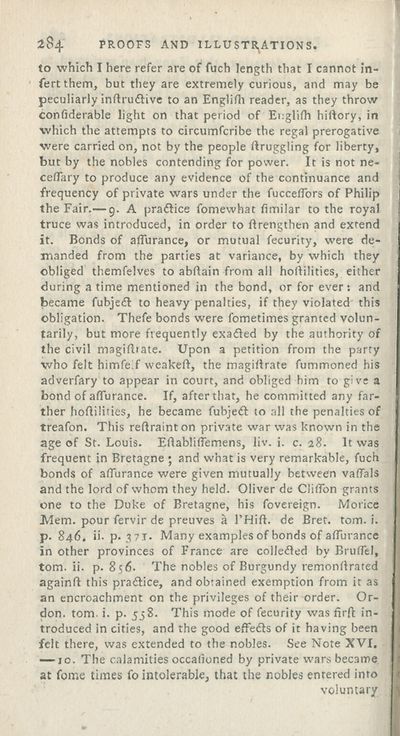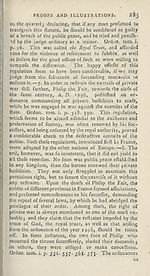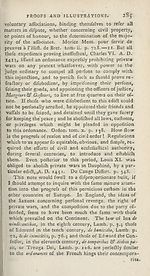Download files
Complete book:
Individual page:
Thumbnail gallery: Grid view | List view

2S4 PROOFS AMD ILLUSTRATIONS.
to which I here refer are o( fuch length that I cannot in-
fertthem, but they are extremely curious, and may be
peculiarly inftrudtive to an Englifh reader, as they throw
confiderable light on that period of Englifh hiftory, in
which the attempts to circumfcribe the regal prerogative
were carried on, not by the people ftruggling for liberty,
but by the nobles contending for power. It is not ne-
cefTary to produce any evidence of the continuance and
frequency of private wars under the fucceffors of Philip
the Fair.— g. A praftice fomewhat fimilar to the royal
truce was introduced, in order to ftrengthen and extend
it. Bonds of aflurance, or mutual fecurity, were de¬
manded from the parties at variance, by which they
obliged themfelves to abftain from all hollilities, either
during a time mentioned in the bond, or for ever : and
became fubjedt to heavy penalties, if they violated this
obligation. Thefe bonds were fometimes granted volun¬
tarily, but more frequently exadled by the authority of
the civil magifhate. Upon a petition from the party
who felt himfe.f wcakeft, the magiflrate fummoned his
adverfary to appear in court, and obliged him to give a
bond of affurance. If, after that, he committed any far¬
ther hoflilities, he became fubjedt to all the penalties of
treafon. This reftrainton private war was known in the
age of St. Louis. Eftabliffemens, liv. i. c. 28. It was
frequent in Bretagne ; and what is very remarkable, fuch
bonds of affurance were given mutually between vaffals
and the lord of whom they held. Oliver de Cliffon grants
one to the Duke of Bretagne, his fovereign. Morice
iMem. pour fervir de preuves a 1’Hifl. de Bret. tom. i.
p. 846. ii- p.371. Many examples of bonds of affurance
in other provinces of France are colledled by Bruffel,
tom. ii. p. 856. The nobles of Burgundy remonflrated
againft this pradlice, and obtained exemption from it as
an encroachment on the privileges of their order. Or-
don. tom i. p. 538. This mode of fecurity was firft in¬
troduced in cities, and the good effedls of it having been
felt there, was extended to the nobles. See Note XVI.
—10. The calamities occafioned by private wars became
at fome times fo intolerable, that the nobles entered into
voluntary
to which I here refer are o( fuch length that I cannot in-
fertthem, but they are extremely curious, and may be
peculiarly inftrudtive to an Englifh reader, as they throw
confiderable light on that period of Englifh hiftory, in
which the attempts to circumfcribe the regal prerogative
were carried on, not by the people ftruggling for liberty,
but by the nobles contending for power. It is not ne-
cefTary to produce any evidence of the continuance and
frequency of private wars under the fucceffors of Philip
the Fair.— g. A praftice fomewhat fimilar to the royal
truce was introduced, in order to ftrengthen and extend
it. Bonds of aflurance, or mutual fecurity, were de¬
manded from the parties at variance, by which they
obliged themfelves to abftain from all hollilities, either
during a time mentioned in the bond, or for ever : and
became fubjedt to heavy penalties, if they violated this
obligation. Thefe bonds were fometimes granted volun¬
tarily, but more frequently exadled by the authority of
the civil magifhate. Upon a petition from the party
who felt himfe.f wcakeft, the magiflrate fummoned his
adverfary to appear in court, and obliged him to give a
bond of affurance. If, after that, he committed any far¬
ther hoflilities, he became fubjedt to all the penalties of
treafon. This reftrainton private war was known in the
age of St. Louis. Eftabliffemens, liv. i. c. 28. It was
frequent in Bretagne ; and what is very remarkable, fuch
bonds of affurance were given mutually between vaffals
and the lord of whom they held. Oliver de Cliffon grants
one to the Duke of Bretagne, his fovereign. Morice
iMem. pour fervir de preuves a 1’Hifl. de Bret. tom. i.
p. 846. ii- p.371. Many examples of bonds of affurance
in other provinces of France are colledled by Bruffel,
tom. ii. p. 856. The nobles of Burgundy remonflrated
againft this pradlice, and obtained exemption from it as
an encroachment on the privileges of their order. Or-
don. tom i. p. 538. This mode of fecurity was firft in¬
troduced in cities, and the good effedls of it having been
felt there, was extended to the nobles. See Note XVI.
—10. The calamities occafioned by private wars became
at fome times fo intolerable, that the nobles entered into
voluntary
Set display mode to:
![]() Universal Viewer |
Universal Viewer | ![]() Mirador |
Large image | Transcription
Mirador |
Large image | Transcription
| Antiquarian books of Scotland > Kings & rulers > History of the reign of the Emperor Charles V. > Volume 1 > (302) |
|---|
| Permanent URL | https://digital.nls.uk/109185955 |
|---|
| Description | By William Robertson. London : Cadell and Davies, 1798. |
|---|---|
| Shelfmark | ABS.1.76.13 |
| Additional NLS resources: | |
| Description | Thousands of printed books from the Antiquarian Books of Scotland collection which dates from 1641 to the 1980s. The collection consists of 14,800 books which were published in Scotland or have a Scottish connection, e.g. through the author, printer or owner. Subjects covered include sport, education, diseases, adventure, occupations, Jacobites, politics and religion. Among the 29 languages represented are English, Gaelic, Italian, French, Russian and Swedish. |
|---|

